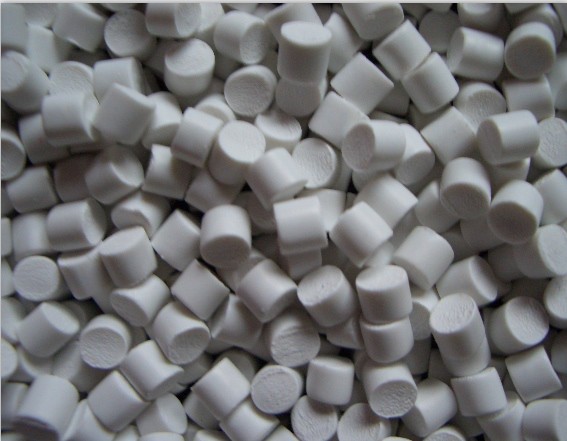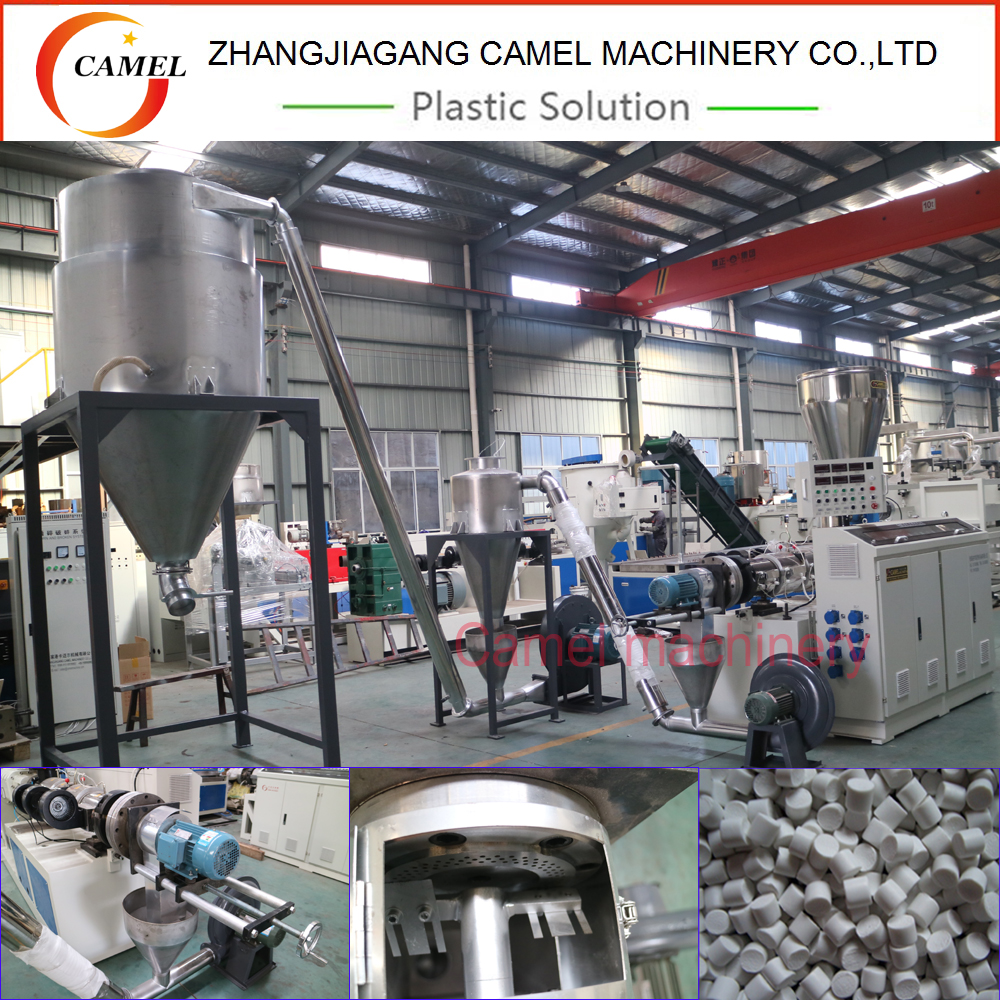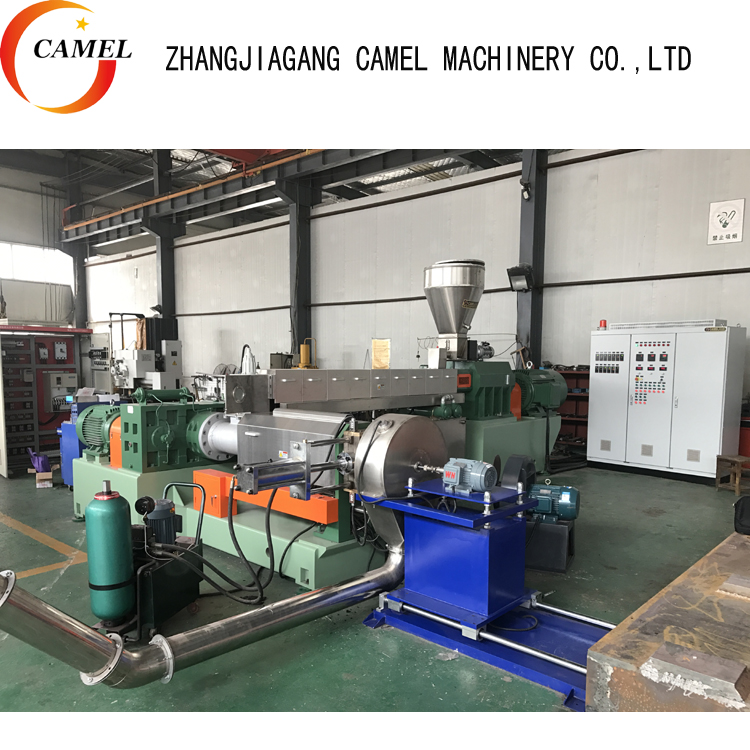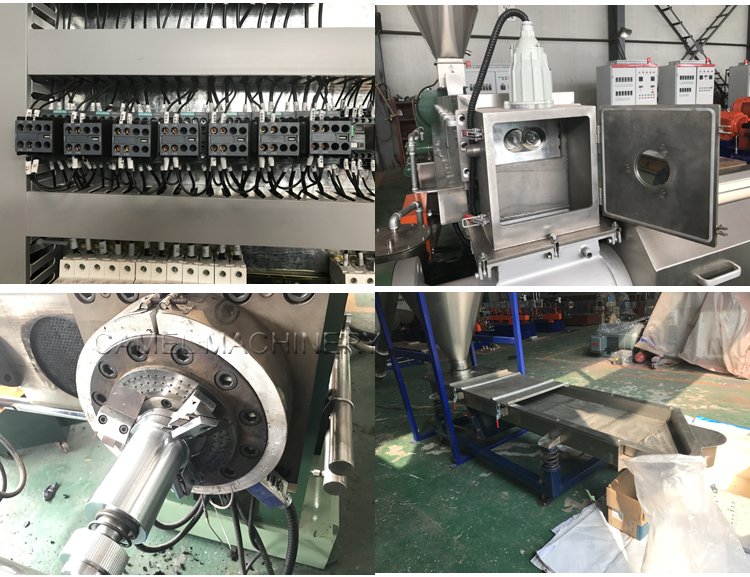Copyright © 2021 Zhangjiagang Camel Machinery Co., Ltd. All rights reserved. Site Map Powered by iwonder.cn
- Phone/WeChat/WhatsApp: 0086-15895699263
- Email: sales@camelmachine.com
PVC granulation processing production process and related attention requirements
The granulation process is a production process in which polymer resin and various additives and auxiliaries are measured, rolled, plasticized, and cut into granular plastics. Plastic granules are semi-finished products in the plastic molding processing industry and are also extrusion products. , injection molding, hollow blow molding, foaming and other forming processing raw materials.

Granulation by extrusion is the most basic and simplest granulation method and is widely used.

(conical twin screw granulator )
For various plastic molding processing methods, compared with direct processing of powder materials, the advantages of using granulated pellets are as follows:
(1) Feeding is convenient and there is no need to install a forced feeder in the feeding hopper.
(2) The relative density of granular materials is higher than that of powder materials, and the strength of plastic products is better.
(3) The mixing of resin and various solid powder materials or liquid additives is relatively uniform, and the physical properties of plastic products are relatively uniform.
(4) Plastic products have uniform color.
(5) The granular material contains less air agent volatiles, making plastic products less likely to produce bubbles.
(6) The pellets have no pollution to the extruder and the production environment.
Production Process:
1. Preparation work before ingredients
Preparatory work before batching includes resin screening, plasticizer filtration, powdered additive refining, drying of raw materials for preparing color masterbatch powder, and heating and melting of block additives.
Polymer resin may be mixed with mechanical impurities or other impurities during the production, packaging, and transportation processes. In order to prevent damage to the granulation equipment and reduce product quality, the resin must be screened before use. Powdered polyvinyl chloride generally uses a 40-mesh screen. Granular polyethylene or polypropylene can be sieved through a fine mesh slightly larger than the particle size of the resin.
In order to prevent mechanical impurities or black garbage in the plasticizer from mixing into the product and affecting product performance, when producing cable materials, the plasticizer is generally filtered through a 60 to 120 mesh filter [60 mesh is used for high viscosity, and 120 mesh is used for small viscosity.
For powdery additives with coarse particles or that are easy to agglomerate, it is best to grind them with plasticizer first, add them as slurry, and mix and disperse them evenly in the resin. The refining equipment is a three-roller grinder. The general ratio of additives and plasticizers in the refining formula is about 1:1, and the slurry fineness index is 60~80 μm.
The proportion of the slurry formula is the ratio of parts by weight. The proportion is mainly determined according to the apparent density of the powder. If the apparent density of the powder is large, a large amount of plasticizer needs to be added. Plasticizers generally use DOP with low viscosity. In the plasticizer dosage, the amount added during refining should be deducted.

(parallel twin screw granulator )
For rigid polyvinyl chloride products, since no plasticizer is added, high-concentration polyvinyl chloride color masterbatch powder is generally produced first, and then added to a kneader for mixing. For example, this method is used for dyeing rigid polyvinyl chloride pipes. When using a kneader to make color masterbatch, stabilizers should be added appropriately to prevent the resin from decomposing.
Resins and additives that easily absorb moisture must be dried and dehydrated before kneading or extruding. For example, nylon resin and ABS resin are easy to absorb water and must be dried to a moisture content of less than 0.1%. Drying equipment includes: boiling dryer, vacuum dryer or vacuum drying hopper.
Some functional masterbatch, such as antistatic masterbatch, anti-adhesion masterbatch, pearlescent masterbatch, filler masterbatch, etc., are easy to absorb moisture and should be dried before adding to the extruder, otherwise it will affect production or reduce the quality of the product. quality.
Both stearic acid and paraffin in the form of blocks are commonly used lubricants in plastic processing. If it is added directly to the kneader, the high-speed rotation in the high-speed kneader will hit the baffle and damage the baffle. Therefore, it must be heated and melted before adding to the kneader. The melting point of stearic acid is 69.60°C, and the melting point of paraffin is 60°C.
2. Formula weighing
For raw materials that are put into a kneader or internal mixer for mixing and mastication, the amount of input should first be estimated based on the equipment volume and input coefficient.
Weigh accurately according to the input amount. The weighing must be accurate, otherwise the quality of the product will be unstable. Weighing scales and automatic measuring devices should be inspected and calibrated regularly to prevent quality fluctuations caused by measurement errors.
3. Knead
Kneading can be divided into heating kneading and cooling kneading, using a high-speed kneader.
The process conditions of heating and kneading: the kneading time of soft polyvinyl chloride is 10~15min, the discharging temperature is 95~100℃; the kneading time of hard polyvinyl chloride is 5~10min, the discharging temperature is 100~110℃. In addition, the order of adding materials during kneading has an impact on the quality of kneading.
Cooling Kneading The temperature of the material coming out of the high-speed kneader is relatively high, exceeding 100°C. If it is put into the storage cylinder, it is prone to discoloration, agglomeration and even material decomposition. Therefore, cooling and mixing need to be carried out immediately to reduce the temperature of the material to below 50°C before it can be stored for use in the extruder. The cooling and mixing process conditions for both soft and hard polyvinyl chloride are as follows: the kneading time is 5 to 10 minutes, and the discharge material temperature is below 50°C.
Use a 50L internal mixer for internal mixing. The process conditions for internal mixing of soft polyvinyl chloride and polyethylene color masterbatch are as follows. The soft vinyl chloride internal mixing time is 3~5min, the internal mixing temperature is 90~110℃, and the discharge material temperature is 100~110℃; polyethylene mixing time is 8~10min, mixing temperature is 80~100℃, and the discharge material temperature is 140~145℃. The mixed materials are in the form of lumps, and no unplasticized powder or granular materials can be released.
4. Extrusion and granulation
Single-screw and twin-screw extruders can be used for extrusion granulation. It mainly controls the extrusion temperature, screw speed, cutter speed and pellet cooling. The pellets will not be sticky, the particle size will be uniform, and the plasticization will be better. The cutter speed is adjusted to the length of the pellet material of 3~4mm. The screw speed is adjusted so that the pellets do not stick to each other.

To extrude soft polyvinyl chloride cable material, the temperature of a single-screw extruder with a diameter of 65mm is 140~150℃, 160~170℃, 150~160℃, 150~160℃, and the rotation speed is 20~30r/min; the diameter is 51 The temperature of the ~150mm twin-screw extruder is 130~140℃, 140~145℃, 150~155℃, 145~150℃, and the screw speed is 15~20r/min. The 6mm diameter parallel twin-screw extruder pellets polyethylene at temperatures of 200~220℃, 230~240℃, 240~250℃, and 250~260℃.